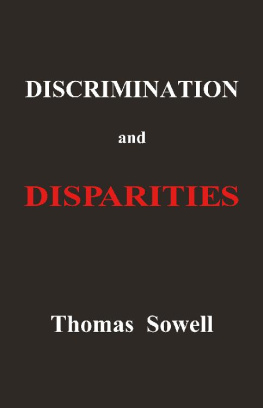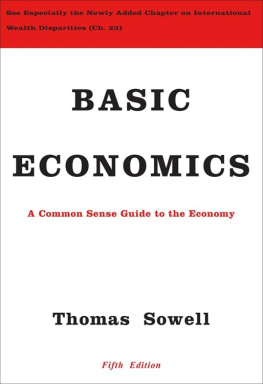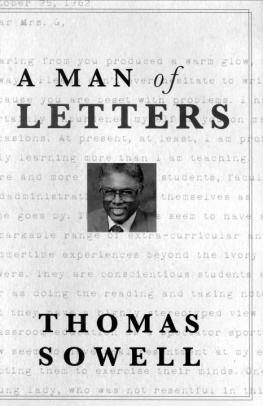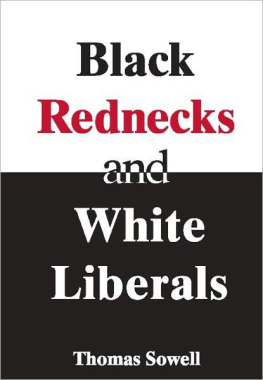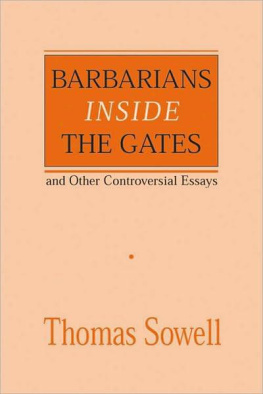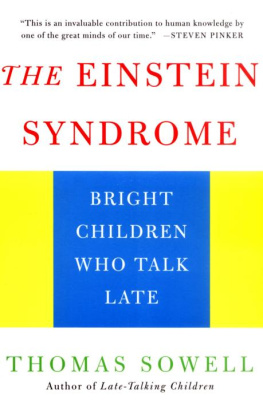

Copyright 2018 by Thomas Sowell
Hachette Book Group supports the right to free expression and the value of copyright. The purpose of copyright is to encourage writers and artists to produce the creative works that enrich our culture.
The scanning, uploading, and distribution of this book without permission is a theft of the authors intellectual property. If you would like permission to use material from the book (other than for review purposes), please contact permissions@hbgusa.com. Thank you for your support of the authors rights.
Basic Books
Hachette Book Group
1290 Avenue of the Americas, New York, NY 10104
www.basicbooks.com
First Edition: March 2018
Published by Basic Books, an imprint of Perseus Books, LLC, a subsidiary of Hachette Book Group, Inc. The Basic Books name and logo is a trademark of the Hachette Book Group.
The publisher is not responsible for websites (or their content) that are not owned by the publisher.
Library of Congress Control Number: 2018931583
ISBNs: 978-1-5416-4560-8 (hardcover), 978-1-5416-4562-2 (ebook)
E3-20190325-JV-PC-AMZ
CONTENTS
To Professor Walter E. Williams, who has labored in the same vineyard.
T he fact that economic and other outcomes often differ greatly among individuals, groups, institutions and nations poses questions to which many people give very different answers. At one end of a spectrum of explanations offered is the belief that those who have been less fortunate in their outcomes are genetically less capable. At the other end of the spectrum is the belief that those less fortunate are victims of other people who are more fortunate. In between, there are many other explanations offered. But, whatever the particular explanation offered, there seems to be general agreement that the disparities found in the real world differ greatly from what might be expected by random chance.
Yet the great disparities in outcomes found in economic and other endeavors need not be due to either comparable disparities in innate capabilities or comparable disparities in the way people are treated by other people. The disparities can also reflect the plain fact that success in many kinds of endeavors depends on prerequisites peculiar to each endeavorand a relatively small difference in meeting those prerequisites can mean a very large difference in outcomes.
PREREQUISITES AND PROBABILITIES
When there is some endeavor with five prerequisites for success, then by definition the chances of success in that endeavor depend on the chances of having all five of those prerequisites simultaneously. Even if none of these prerequisites is rarefor example, if these prerequisites are all so common that chances are two out of three that any given person has any one of those five prerequisitesnevertheless the odds are against having all five of the prerequisites for success in that endeavor.
When the chances of having any one of the five prerequisites are two out of three, as in this example, the chance of having all five is two-thirds multiplied by itself five times. That comes out to be 32/243 in this example, or about one out of eight. In other words, the chances of failure are about seven out of eight. This is obviously a very skewed distribution of success, and nothing like a normal bell curve of distribution of outcomes that we might expect otherwise.
What does this little exercise in arithmetic mean in the real world? One conclusion is that we should not expect success to be evenly or randomly distributed among individuals, groups, institutions or nations in endeavors with multiple prerequisiteswhich is to say, most meaningful endeavors. And if these are indeed prerequisites, then having four out of five prerequisites means nothing, as far as successful outcomes are concerned. In other words, people with most of the prerequisites for success may nevertheless be utter failures.
Whether a prerequisite that is missing is complex or simple, its absence can negate the effect of all the other prerequisites that are present. If you are illiterate, for example, all the other good qualities that you may have in abundance count for nothing in many, if not most, careers today. As late as 1950, more than 40 percent of the worlds adult population were still illiterate. That included more than half the adults in Asia and Africa.
If you are not prepared to undergo the extended toil and sacrifice that some particular endeavor may require, then despite having all the native potential for great success in that endeavor, and with all the doors of opportunity wide open, you can nevertheless become an utter failure.
Not all the prerequisites are necessarily within the sole control of the individual who has them or does not have them. Even extraordinary capacities in one or some of the prerequisites can mean nothing in the ultimate outcome in some endeavors.
Back in the early twentieth century, for example, Professor Lewis M. Terman of Stanford University launched a research project that followed 1,470 people with IQs of 140 and above for more than half a century. Data on the careers of men in this groupfrom a time when full-time careers for women were less commonshowed serious disparities even within this rare group, all of whom had IQs within the top one percent.
Some of these men had highly successful careers, others had more modest achievements, and about 20 percent were clearly disappointments. Of 150 men in this less successful category, only 8 received a graduate degree, and dozens of them received only a high school diploma. A similar number of the most successful men in Termans group received 98 graduate degreesmore than a tenfold disparity among men who were all in the top one percent in IQ.
Meanwhile, two men who were tested in childhood, and who failed to make the 140 IQ cutoff level, later earned Nobel Prizesas none of the men with IQs of 140 and above did. Clearly, then, all the men in Termans group had at least one prerequisite for that extraordinary achievementnamely, a high enough IQ. And, equally clearly, there must have been other prerequisites that hundreds of these men with IQs in the top one percent did not have.
As for factors behind differences in educational and career outcomes within Termans group, the biggest differentiating factor was in family backgrounds. Men with the most outstanding achievements came from middle-class and upper-class families, and were raised in homes where there were many books. Half of their fathers were college graduates, at a time when that was far more rare than today.
Among those men who were least successful, nearly one-third had a parent who had dropped out of school before the eighth grade. Even extraordinary IQs did not eliminate the need for other prerequisites.
Sometimes what is missing may be simply someone to point an individual with great potential in the right direction. An internationally renowned scholar once mentioned, at a social gathering, that when he was a young man he had not thought about going to collegeuntil someone else urged him to do so. Nor was he the only person of exceptional ability of whom that was true.
Some other people, including people without his great abilities, would automatically apply to college if they came from particular social groups where that was a norm. But without that one person who urged him to seek higher education, this particular internationally renowned scholar might well have become a fine automobile mechanic or a worker in some other manual occupation, but not a world-class scholar.



